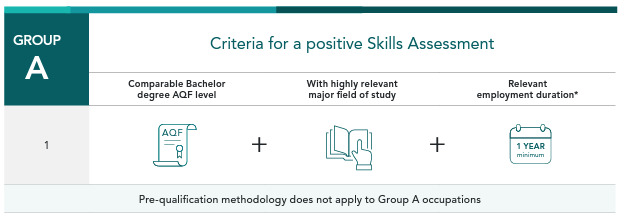An Environmental Research Scientist studies and develops policies and plans for the control of factors that may produce pollution, imbalance in, or degradation of the environment.
Occupation description
An Environmental Research Scientist studies and develops policies and plans for the control of factors that may produce pollution, imbalance in, or degradation of the environment.
Occupations considered suitable under this ANZSCO code:
- Air Pollution Analyst
- Ecologist
- Land Degradation Analyst
- Water Quality Analyst
Occupations not considered suitable under this ANZSCO code:
- Environmental Consultant
- Environmental Health Officer
- Environmental Manager
- Marine Biologist
These occupations are classified elsewhere in ANZSCO or are not at the required skill level.
Environmental Research Scientist is a VETASSESS Group A occupation
This occupation requires a qualification assessed as comparable to the educational level of an Australian Qualifications Framework (AQF) Bachelor degree or higher, in a field highly relevant to the nominated occupation. Applicants must also have at least one year of highly relevant, post-qualification employment, at an appropriate skill level completed in the last five years.
Applicants will not meet the required skill level if:
- The qualification(s) are not at the required educational level.
- The qualification(s) are not in a highly relevant field of study.
- The employment has been completed prior to the completion of the qualification.
A positive assessment of both qualifications and employment is required for a positive Skills Assessment outcome.

** Highly relevant paid employment duration (20 hours or more per week):
One year of post-qualification paid employment (20 hours or more per week) highly relevant to the nominated occupation, at an appropriate skill level in the last five years before the date of application for a Skills Assessment.
Qualification and Employment Criteria
AQF Bachelor degree or higher degree
This includes qualifications assessed at AQF Bachelor, Master and Doctoral level.
Highly relevant major fields of study include:
- Environmental Science
- Climate Science
- Environment and Sustainability
- Environmental Engineering
The majors listed below may be considered on a case-by-case basis if they were awarded prior to attaining at least one year of highly relevant employment in the relevant research field:
- Ecology
- Biodiversity
- Marine Biology
- Natural Vegetation and Wildlife
- Weather and Climate
- Coastal Engineering
- Conservation Science
- Land and Water Management
- Geographical Information Systems
- Biosecurity
- Forestry
Employment
Highly relevant tasks include, but are not limited to:
- Studying the effects on animal and plant life of factors such as terrain, altitude, climatic and environmental change, sources of nutrition, predators and the impacts of humans.
- Studying and analysing pollution, atmospheric conditions, demographic characteristics, ecology, mineral, soil and water samples.
Additional tasks may include:
- Developing and testing models of the environment using knowledge of ecology, mathematics, statistics and physical sciences.
- Conducting environmental impact assessments/ audits.
- Investigating the structure of communities of organisms and predicting the effects of disturbances by human or environmental changes.
- Developing conservation and management policies for biological resources, such as fish populations and forests, and establishing standards and developing approaches for the control of pollution and the rehabilitation of areas disturbed by activities such as mining, timber felling and overgrazing.
- Proposing solutions to address negative environmental impact.
- Preparing graphs, charts and statistics from data, analysing data and correlating them with the work of other scientists, evaluating data and preparing reports of conclusions.
- Planning and conducting field trips to study animals and plants in their natural environments and to collect specimens for laboratory study.
- Assisting in developing policies, strategies and codes of practice on environmental management..
Employment information
Scientists engaged in environmental research usually work for government agencies, universities, or private companies in energy, water, waste services, gas, mining, construction, and land development. Depending on the area of research, tasks can be performed either in an office, a laboratory or outdoor locations.
An ecologist is a scientist who studies how animals and plants interact with their environment.
This occupation is not to be confused with the occupation of Environmental Consultant (ANZSCO 234312). An Environmental Consultant analyses and advises on policies guiding the design, implementation and modification of government or commercial environmental operations and programs. Therefore, employment as an Environmental Consultant will not be considered as highly relevant under this occupation.
Furthermore, employment roles that require routine testing of samples such as water, air, soil, or other environmental samples to identify contaminants and which do not involve independent research would not fit the scope of this occupation.
Supporting Material for Assessment
When applying for a Skills Assessment, please ensure you submit sufficient evidence supporting your proof of identity, qualification and employment claims. A full list of the documents required can be found on the VETASSESS website under Eligibility Criteria. You may provide additional evidence supporting your role, such as a summary brief for grant applications or similar projects, research articles or conference proceedings, laboratory reports, patents and a list of research projects outlining your responsibilities.
Get Support
Help with a Skills Assessment
Skills Assessment Support (SAS) services are for migration agents, legal practitioners and prospective applicants who are yet to submit their Skills Assessment application to VETASSESS.
Help with an urgent application
For general and professional occupations, priority processing can be used to fast-track urgent applications
How to apply
If you're a professional choosing to migrate to Australia, chances are you're likely to be assessed by us. We assess 360 different professional occupations, assessing your skills, experience and qualifications.
Find
Find the VETASSESS occupation that most closely fits your skills and experience.
Match
Match your skills and experience to your chosen occupation.
Prepare
Get ready to apply by preparing all the information and documents you need.
Apply
Apply online when you’re ready. If you’re still unsure, skills assessment support is available when you need it.